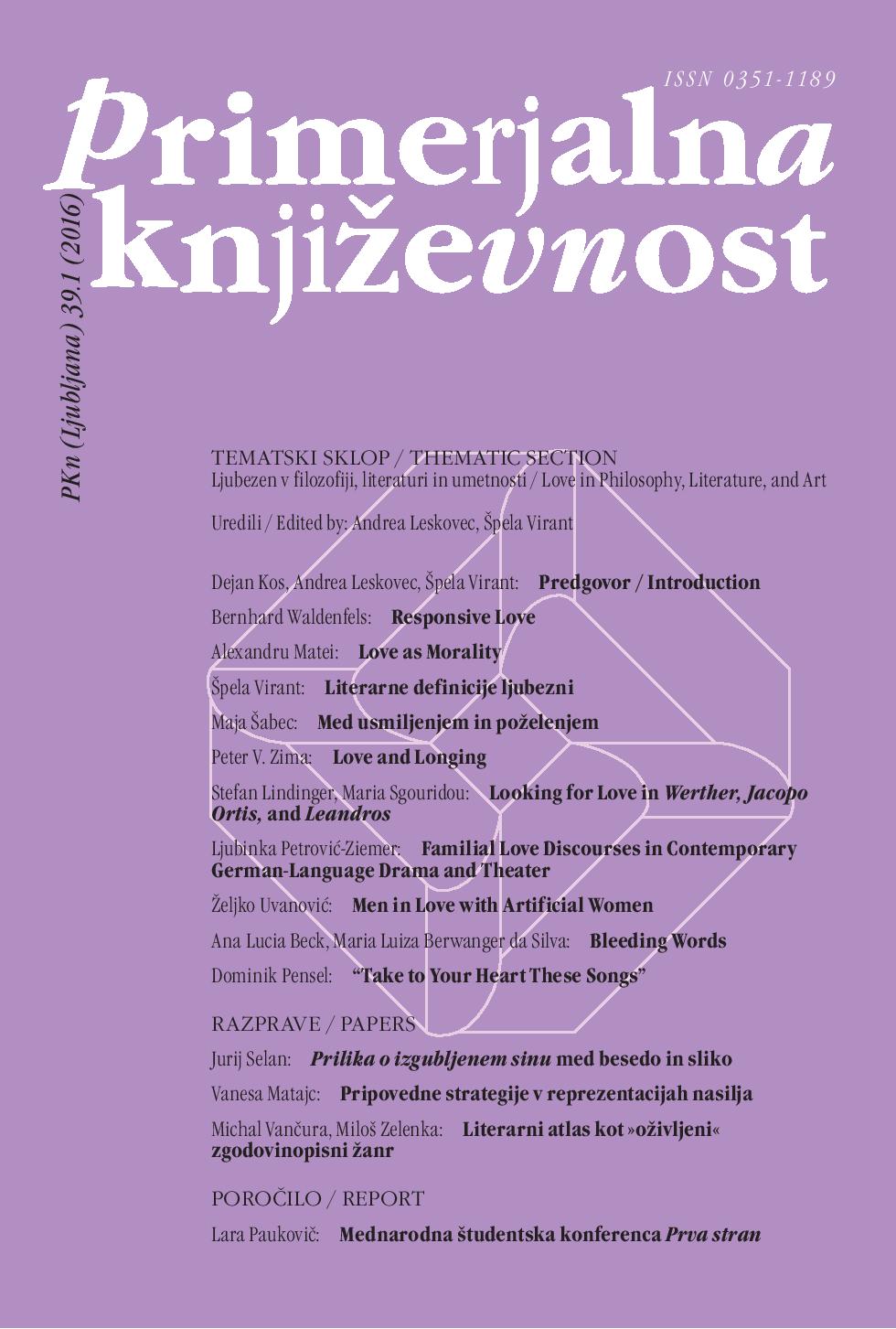“Take to Your Heart These Songs”: Love, Eros, and Artistic Production in the Nineteenth Century
Keywords:
artistic creativity, love, eros, genius, unconsciousness, romantic aestheticism, German literature, German musicAbstract
Love, eros, and art hold a productive relationship which the early nineteenth century imagined to be the creative origin of art. After having reconstructed an ingenious-romantic model of artistic production, the paper shows that this love-based art-eros-model served as reference point in literature and music throughout the whole century, reflecting not only poetological but also fundamental socio-historical questions.References
Barthes, Roland. The Responsibility of Forms: Critical Essays on Music, Art, and Representation. New York: Hill & Wang, 1985.
Beethoven, Ludwig van. Werke. Vol. XII/1. Ed. Helga Lühning. Munich: G. Henle, 1990.
Begemann, Christian. “Kunst und Liebe. Ein ästhetisches Produktionsmythologem zwischen Klassik und Realismus.“ Zwischen Goethezeit und Realismus. Ed. Michael Titzmann. Tübingen: Niemeyer, 2002: 79–112.
– – –. “Prokreation und Werkstatt. Modelle von Kunstproduktion in Richard Wagners Die Meistersinger von Nürnberg.” Natalität. Eds. Aage Hansen-Löve etc. Munich: Fink, 2014: 59–74.
Borchmeyer, Dieter. Drama and the World of Richard Wagner. Princeton: Princeton University Press, 2003.
Bronfen, Elisabeth. Over Her Dead Body: Death, Femininity and the Aesthetic. Manchester: Manchester University Press, 1992.
Dahlhaus, Carl. Richard Wagner’s Music Dramas. Cambridge: Cambridge University Press, 1992.
Derrida, Jacques. Of Grammatology. Baltimore: John Hopkins University Press, 1998.
Freud, Sigmund. “‘Civilized’ Sexual Morality and Modern Nervous Illness.” SE Vol. 9. 181–204.
– – –. “New Introductory Lectures on Psycho-Analysis.” SE Vol. 22. 5–182.
Godard, Benjamin. Dante. Opéra en Quatre Actes de Éduard Blau. Musique de Benjamin Godard. Paris: Choudens, 1890.
Hadlock, Heather L. Mad Loves: Women Band Music in Offenbach’s Les Contes d’Hoffmann. Princeton: Princeton University Press, 2000.
Hebbel, Friedrich. Sämtliche Werke. Historisch-kritische Ausgabe. Ed. Richard M. Werner. Berlin: Behr, 1904.
Heine, Heinrich. Historisch-kritische Gesamtausgabe der Werke. Vol. VIII/1. Ed. Manfred Windfuhr. Hamburg: Hoffmann & Campe, 1979.
Herder, Johann G. Werke in zehn Bänden. Bd. 6. Ed. Martin Bollacher. Frankfurt am Main: DKV, 1989.
Hoffmann, Ernst T. A. Sämtliche Werke in sechs Bänden. Ed. Gerhard Allroggen etc. Frankfurt am Main: DKV, 1988ff.
Hufeland, Christoph W. Makrobiotik, oder die Kunst das menschliche Leben zu verlängern. Bd. 2. Berlin: Wittich, 1805.
Kaye, Michael/Keck, Jean-Christophe. “Vorwort.“ Web 21 March 2016. http://www.schott-music.com/shop/resources/694158.pdf.
Koschorke, Albrecht. Die Geschichte des Horizonts. Grenze und Grenzüberschreitung in literarischen Landschaftsbildern. Frankfurt am Main: Suhrkamp, 1990.
Kramer, Lawrence. “On Deconstructive Text-Music-Relationships.” Music, Culture and Society. Ed. Derek B. Scott. New York: Oxford University Press, 2000: 173–179.
Luhmann, Niklas. Love as Passion: The Codification of Intimacy. Standford, CA: Stanford University Press, 1998.
Lukas, Wolfgang. “‘Gezähmte Wildheit’. Zur Rekonstruktion der literarischen Anthropologie des ‘Bürgers’ um die Jahrhundertmitte (ca. 1840–60).“ Menschenbilder. Eds. Achim Barsch and Peter M. Hejl. Frankfurt am Main: Suhrkamp, 2000: 335–375.
Marston, Nicholas. “Voicing Beethoven’s Distant Beloved.” Beethoven and His World. Eds. Scott Burnham and Michael P. Steinberg. Princeton/Oxford: Princeton University Press, 2000: 124–150.
Marquard, Odo. Transzendentaler Idealismus – Romantische Naturphilosophie – Psychoanalyse. Köln: Dinter, 1987.
Mundt, Theodor. Charlotte Stieglitz. Ein Denkmal. Berlin: Veit & Comp., 1835.
Nietzsche, Friedrich. The Birth of the Tragedy and Other Writings. Eds. Raymond Geuss and Ronald Speirs. Cambridge etc.: Cambridge University Press, 1999.
– – –. Human, All Too Human: A Book for Free Spirits. Cambridge etc.: Cambridge University Press, 1996.
Offenbach, Jacques. Les Contes d’Hoffmann. Opéra fantastique en cinque actes. Eds. Michael Kaye and Jean-Christophe Keck. Mainz/Berlin (unpublished material, by courtesy of Christian Hoesch).
Offenbach, Jacques and Barbier, Jules. Les Contes d’Hoffmann. Fantastische Oper in fünf Akten. Ed. Josef Heinzelmann. Stuttgart: Reclam, 2005.
Pfisterer, Ulrich. Kunst-Geburten. Kreativität, Erotik, Körper in der Frühen Neuzeit. Berlin: Wagenbach, 2014.
Poe, Edgar A. Selected Tales. London/New York: Penguin, 1994.
– – –. “The Philosophy of Composition.” Graham’s Magazine 28.4 (1846): 163–167.
Pourvoyeur, Robert. “Bruch oder Kontinuität im Schaffen Offenbachs?“ Jacques Offenbach und seine Zeit. Ed. Elisabeth Schmierer. Laaber: Laaber, 2009: 161–172.
Reynolds, Christopher. “The Representational Impulse in Late Beethoven: An die ferne Geliebte.“ Acta Musicologica 60.1 (1988): 43–61.
Schmidt, Ricarda. “From Early to Late Romanticism.” The Cambridge Companion to German Romanticism. Ed. Nicholas Saul. Cambridge: Cambridge University Press, 2009. 21–40.
Schneider, Martin. Wissende des Unbewussten. Romantische Anthropologie und Ästhetik im Werk Richard Wagners. Berlin/Boston: De Gruyter, 2013.
Schubert, Franz. Neue Ausgabe sämtlicher Werke. Vol. IV 1/a. Ed. Walther Dürr. Kassel etc.: Bärenreiter, 1970.
Schumann, Robert. Briefe. Ed. Gustav Jansen. Leipzig: Breitkopf & Härtel, 1904.
Shiner, Larry. The Invention of Art: A Cultural History. Chicago: University of Chicago Press, 2003.
Smith, Richard L. “Art. Godard, Benjamin.” The New Grove Dictionary of Music and Musicians. Vol. 10. Ed. Stanley Sadie. London: Macmillan, 2001: 68–70.
Wagner, Richard. Tannhäuser. Textbuch der letzten Fassung mit Varianten der Partitur und der vorangehenden Fassungen. Ed. Egon Voss. Stuttgart: Reclam, 2001.
– – –. Die Meistersinger von Nürnberg. Textbuch der Fassung der Uraufführung mit Varianten der Partitur. Ed. Egon Voss. Stuttgart: Reclam, 2002.
Wellbery, David E. “Kunst – Zeugung – Geburt. Überlegungen zu einer anthropologischen Grundfigur.” Kunst – Zeugung – Geburt. Eds. Christian Begemann and David E. Wellbery. Freiburg im Breisgau: Rombach, 2002: 9–36.
Young, Edward. Conjectures on Original Composition. London: Millar & Dodsley, 1759.


